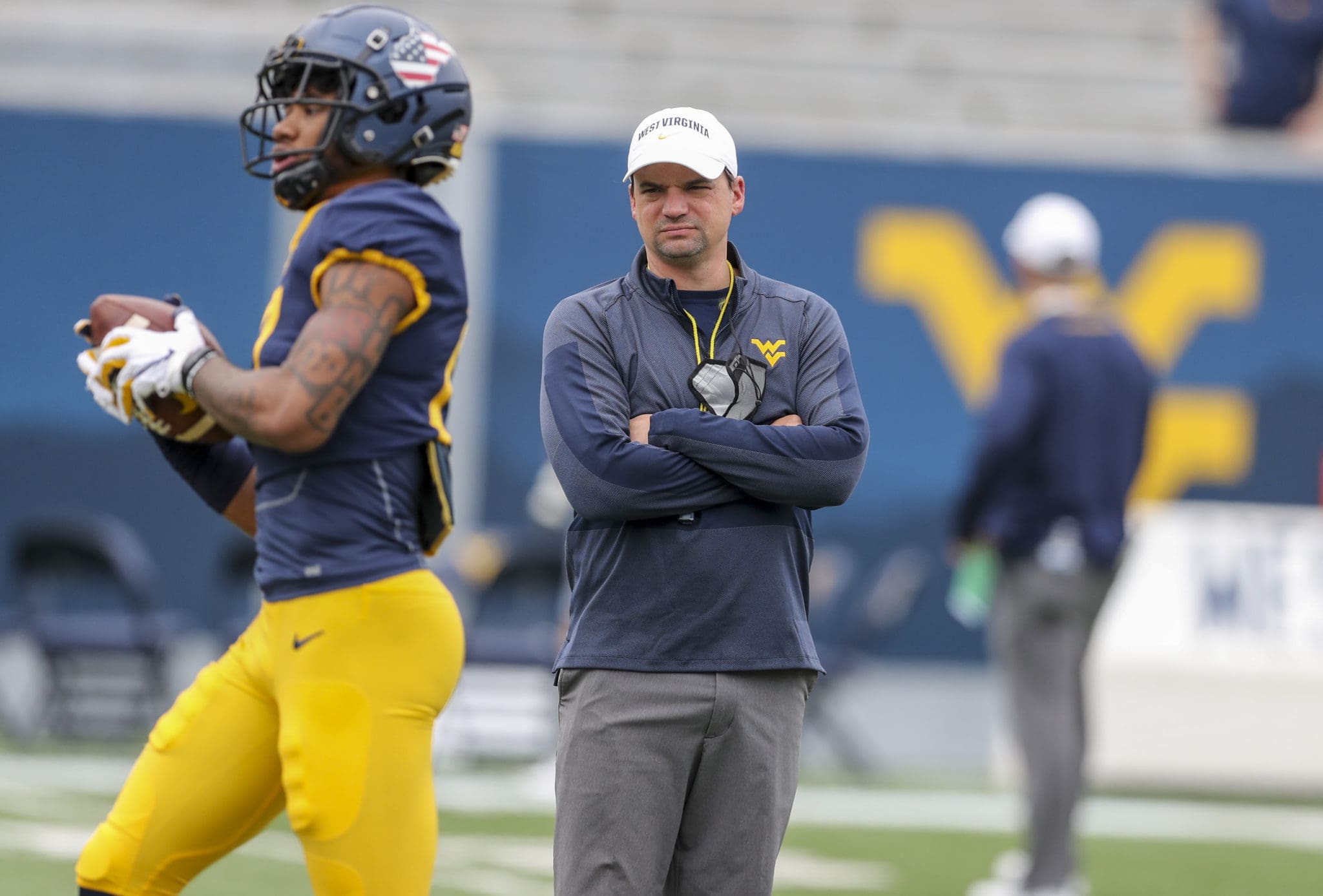WVU Football
‘One-Eleventh’: How WVU Football’s Brown Holds Team Accountable

MORGANTOWN, W.Va. – West Virginia head coach Neal Brown prioritizes taking personal responsibility to the impact of player success and failure. Accountability is woven into the very fibers of his coaching style; it trickles down to the players and tertiary coaching staff as well.
The defense meetings, including the defensive line and safety rooms, work exclusively on owning up to miscues and mistakes made. Whether it’s during practice or in a game scenario like last Saturday’s Maryland loss, Brown has instituted initiatives within his program that emphasize personal growth. Dating back to the days of the late Bobby Bowden, this Mountaineer program has implemented personal accountability programming within the player groups and the team as a whole, and Brown is intent on continuing the tradition of success.
Bowden’s “Bomb Squad” was put in place to congratulate players who exhibited offseason work ethic and dedication to personal improvement. Assessed by the players, the “bombers” were placed on a 1 to 100 scale based on their personal reactions to missteps and mistakes throughout the year. The goal was to fall somewhere in the middle of the group, if not at the very bottom.
During the Nehlen and Rodriguez eras, similar initiatives occurred in the offseason which bled into on-field accountability during games, but few of them actually incorporated football acuity. For Brown, the emphasis is on work in the weight room and the classroom that result in both a better football player, but also a more well-rounded young man. When there’s focus on the smaller details during the offseason, they’re easier to own up to in the event that one becomes a glaring mistake come game time.
“Here, we talk about one-eleventh here a lot,” Brown said. “On defense, that’s kind of our mantra, one-eleventh. Really what that means is: ‘Do your job.’”
The “one-eleventh” mantra began with Buffalo Bills head coach Sean McDermott, who saw each man on the field as a unique opportunity to contribute. Each player, specifically chosen to take the field for one of a thousand reasons, was selected from the depth chart because coaches, like Brown, saw potential. With success also comes failure, and at times, when the stakes are high and the emotions are wound tightly, it can be difficult for players to own up to errors.
When Brown met with the media on Tuesday afternoon, he laid out exactly where the team had failed. He detailed, in complete, unwavering transparency, the areas that created major scoring opportunities for the Terrapins and stressed the importance of fixing issues on the spot.
“Football is the greatest team game, and all the pieces work together…” Brown said. “On defense, we’ve got to play good team defense, and that means everybody doing their job.”
The one-eleventh mentality is especially important for Brown’s defense. When the entirety of those eleven players gels well, the Mountaineer secondary can easily quell any offensive rush.
“The beautiful part for us defensively is that if we’re all wrong, we can all be right,” safeties coach Dontae Wright said. “What I mean by that is if all 11 are on the same page, or if it’s just the backs. If all five are on the same page, we’ll not have any issues. The problems come when they won’t communicate and get on the same page. Now, you’ve got half of them playing cover-2 and the other half playing man. You’re in trouble then. Past the communication is just making sure everybody is on the same page, especially for my group, because we’re essentially the quarterbacks on defense.”
Through a combination of increased communication and accountability in the face of mistakes, this Mountaineer defense is poised to only improve from the Maryland road loss.
“I’ve been excited about this group,” defensive coordinator Jordan Lesley said. “Still excited about this group. It’s got to be a learning experience. It’s got to be a humbling experience. We’re not the group from last year. To think we are… we’re not… but those guys that you saw, they’ve already owned up to those mistakes. We’ll be better as a whole.”
Brown’s accountability programming exists the entire year, even when the players aren’t suiting up.
His seven month-offseason is spent putting each player on one of 10 “Accountability Teams”. The team captains this offseason were redshirt junior quarterback Jarret Doege, redshirt senior safety Alonzo Addae, junior running back Leddie Brown, redshirt freshman center Zach Frazier, junior defensive end Dante Stills, sophomore cornerback Nicktroy Fortune, redshirt sophomore tight end Mike O’Laughlin, redshirt senior safety Sean Mahone, freshman quarterback Garrett Greene, and junior linebacker Josh Chandler-Semedo.
𝟮𝟬𝟮𝟭 𝗔𝗖𝗖𝗢𝗨𝗡𝗧𝗔𝗕𝗜𝗟𝗜𝗧𝗬 𝗖𝗛𝗔𝗠𝗣𝗜𝗢𝗡𝗦
🏆 𝚃𝙴𝙰𝙼 𝙲𝙾𝙼𝙿𝙴𝚃𝙴 🏆
Led by @DoegeJarret#TrustTheClimb pic.twitter.com/G5bu262xxU— WVU Football (@WVUfootball) August 14, 2021
The teams are evaluated based on academics, strength and conditioning, nutrition, and community service. Preparing for the pressures of game time decisions when the stakes are lower allows players to familiarize themselves with taking credit for failure. Each starter is keenly aware of how he can contribute on and off the field, but it transcends play on Saturday.
Additionally, the newest piece of Brown’s in-season work is the “Fifth Quarter Program”. It’s designed to assist the WVU football players on five pillars: character development, leadership development, life outside of football, career development, and social responsibility.
“Football has given these student-athletes a valuable opportunity that is not afforded to everybody, but it is up to them what they do with it,” Brown said. “We are coaching them on the field to develop their physical skills within the team. With the 5th Quarter program, we are going to give them the tools and knowledge to build their confidence in a variety of areas while they earn their degrees. We are hopeful that the end result will allow them to be successful, productive, and valuable alumni once they leave Morgantown.”





















